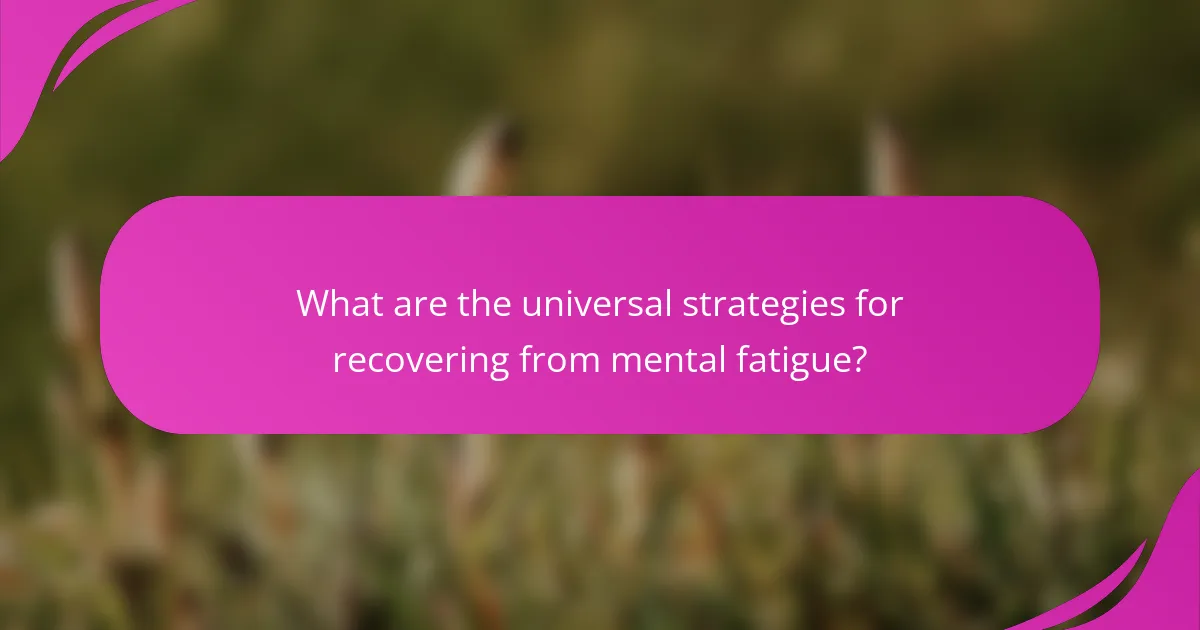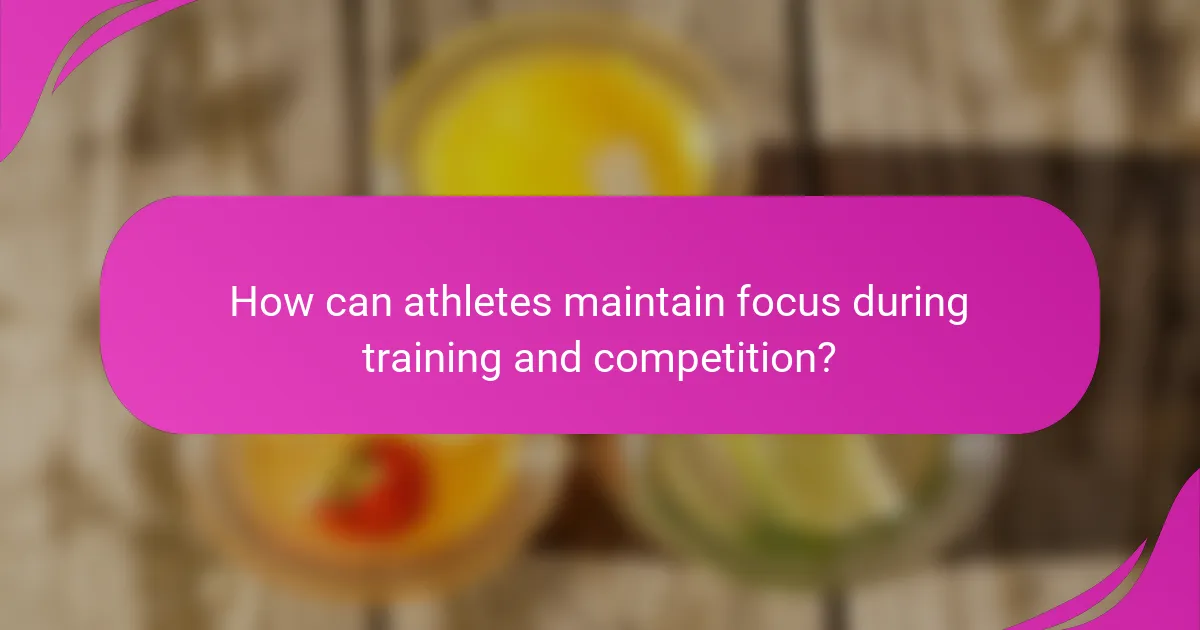Recovering from mental fatigue is crucial for athletes seeking to enhance focus and performance. Effective strategies include prioritizing structured rest, practicing mindfulness, and optimizing nutrition. Techniques like visualization and cognitive training can further improve mental clarity. Additionally, exploring unique methods such as neurofeedback and floatation therapy may offer innovative solutions for mental rejuvenation.

What is mental fatigue and how does it impact athletic performance?
Mental fatigue is a state of mental exhaustion that negatively affects athletic performance. It can lead to decreased focus, slower reaction times, and impaired decision-making. Athletes can recover from mental fatigue through strategies such as structured rest, mindfulness practices, and cognitive training. These approaches enhance focus and overall performance by addressing both the psychological and physiological aspects of fatigue. Regularly incorporating recovery strategies helps maintain optimal mental clarity and resilience during training and competition.
What are the common symptoms of mental fatigue in athletes?
Common symptoms of mental fatigue in athletes include decreased motivation, difficulty concentrating, irritability, and feelings of exhaustion. These symptoms can significantly impact performance and training effectiveness. Mental fatigue may also manifest as reduced decision-making abilities and slower reaction times. Recognizing these signs is crucial for implementing effective recovery strategies.
How does mental fatigue differ from physical fatigue?
Mental fatigue differs from physical fatigue in that it primarily affects cognitive functions rather than physical capabilities. Mental fatigue results from prolonged mental effort, leading to decreased concentration and motivation. In contrast, physical fatigue stems from exertion and impacts muscle performance and energy levels. Recognizing these differences is crucial for athletes aiming to enhance performance through targeted recovery strategies.

What are the universal strategies for recovering from mental fatigue?
To recover from mental fatigue, athletes should implement strategies that enhance focus and performance. Prioritizing rest is essential; adequate sleep improves cognitive function and reduces fatigue. Regular breaks during training can rejuvenate mental energy. Mindfulness practices, such as meditation, foster concentration and alleviate stress. Nutrition plays a crucial role; a balanced diet rich in omega-3 fatty acids and antioxidants supports brain health. Hydration is vital; even mild dehydration can impair cognitive performance. Lastly, setting realistic goals can help manage mental load and maintain motivation.
How important is sleep for mental recovery?
Sleep is crucial for mental recovery, significantly enhancing focus and performance. Quality sleep restores cognitive functions, improves mood, and reduces fatigue. Studies indicate that athletes performing on insufficient sleep experience decreased reaction times and impaired decision-making. Prioritizing sleep can lead to better training outcomes and overall mental resilience.
What role does nutrition play in mental fatigue recovery?
Nutrition plays a crucial role in mental fatigue recovery by providing essential nutrients that support brain function. Balanced intake of carbohydrates, proteins, and fats enhances energy levels and cognitive performance. For example, omega-3 fatty acids improve mood and reduce fatigue, while complex carbohydrates stabilize blood sugar. Adequate hydration is also vital, as dehydration can exacerbate mental fatigue. Consuming a variety of fruits and vegetables ensures a supply of antioxidants, which combat oxidative stress in the brain. Prioritizing these nutritional elements can significantly enhance recovery from mental fatigue.
How can hydration levels affect mental performance?
Hydration levels significantly impact mental performance by affecting cognitive functions and focus. Dehydration can lead to fatigue, reduced attention, and impaired decision-making. Studies show that even mild dehydration can decrease cognitive performance by 10-20%. Maintaining optimal hydration enhances concentration, memory, and overall mental clarity, crucial for athletes and high-performance individuals.

What unique techniques can enhance recovery from mental fatigue?
To enhance recovery from mental fatigue, athletes can employ techniques such as mindfulness meditation, structured rest periods, and cognitive behavioral strategies. Mindfulness meditation improves focus and reduces stress, while structured rest periods allow for mental rejuvenation. Cognitive behavioral strategies help in reframing negative thoughts, promoting a positive mindset. These techniques can significantly improve performance and mental clarity.
How can mindfulness practices improve mental clarity?
Mindfulness practices enhance mental clarity by promoting focus and reducing distractions. Techniques such as meditation and deep breathing improve cognitive function and decision-making. Regular mindfulness practice can lead to a 23% increase in attention span, significantly benefiting athletes seeking peak performance. Additionally, mindfulness fosters emotional regulation, allowing for better stress management during intense competition.
What are some effective mental training exercises?
Effective mental training exercises include visualization, mindfulness meditation, breathing techniques, and cognitive restructuring. These practices enhance focus, reduce mental fatigue, and improve overall performance. For example, visualization techniques involve imagining successful outcomes, which can boost confidence and motivation. Mindfulness meditation promotes awareness and helps athletes manage stress. Breathing techniques, such as diaphragmatic breathing, can calm the mind and improve concentration. Cognitive restructuring encourages athletes to identify and challenge negative thoughts, fostering a positive mindset.
How can visualization techniques aid recovery?
Visualization techniques can significantly aid recovery from mental fatigue by enhancing focus and reducing stress. These techniques allow athletes to mentally rehearse performance, improving confidence and motivation. Studies show that visualization can lead to quicker recovery times and better mental clarity, essential for peak performance. Engaging in regular visualization practices helps athletes create mental resilience, which is a unique attribute of effective recovery strategies.

What rare methods are available for combating mental fatigue?
Uncommon methods for combating mental fatigue include neurofeedback, transcranial magnetic stimulation (TMS), and floatation therapy. Neurofeedback trains brain activity, enhancing focus and reducing fatigue. TMS uses magnetic fields to stimulate nerve cells, improving mood and cognitive function. Floatation therapy, involving sensory deprivation, promotes relaxation and mental clarity. These methods are gaining attention for their unique approaches to mental fatigue recovery.
How can technology assist in monitoring mental fatigue?
Technology can significantly aid in monitoring mental fatigue through various tools and applications. Wearable devices track physiological metrics like heart rate and sleep patterns, providing insights into fatigue levels. Mobile apps utilize cognitive assessments to evaluate focus and attention, offering personalized feedback. Data analytics can identify fatigue trends, allowing for timely interventions. These technologies empower athletes to optimize performance and recovery strategies effectively.
What role does mental coaching play in recovery?
Mental coaching plays a crucial role in recovery from mental fatigue by enhancing focus and performance. It provides athletes with strategies to manage stress, develop resilience, and maintain motivation. Effective mental coaching can lead to improved mental clarity and emotional stability, which are essential for optimal performance. Additionally, personalized mental coaching can address unique challenges faced by athletes, fostering a tailored approach to recovery.

How can athletes maintain focus during training and competition?
Athletes can maintain focus during training and competition by employing mental strategies such as visualization, mindfulness, and goal-setting. Visualization helps athletes mentally rehearse their performance, enhancing confidence and concentration. Mindfulness practices, like deep breathing, reduce anxiety and improve present-moment awareness. Goal-setting provides clear objectives, directing focus and motivation. Regularly practicing these techniques can lead to improved mental resilience and performance consistency.
What are the best practices for setting mental performance goals?
To set effective mental performance goals, athletes should focus on specificity, measurability, and realism. Establish clear and detailed objectives that can be tracked over time. For example, rather than aiming to “improve focus,” set a goal to “reduce distractions during practice by 50%.” Incorporate regular assessments to gauge progress and adjust goals as needed. Additionally, ensure that goals align with overall performance enhancement strategies, promoting mental resilience and recovery from fatigue.
How can routine adjustments improve focus and performance?
Routine adjustments can significantly enhance focus and performance by optimizing mental energy. Implementing small changes in daily routines, such as adjusting sleep schedules or incorporating brief breaks, can lead to improved cognitive function. Research indicates that even short pauses during intense focus periods can boost overall productivity and mental clarity. As a result, athletes and individuals seeking performance enhancement can benefit from these strategic modifications, leading to better outcomes in their respective fields.

What common mistakes should athletes avoid during recovery?
Athletes should avoid neglecting rest, skipping hydration, ignoring nutrition, and failing to listen to their bodies during recovery. Prioritizing these aspects enhances mental resilience and overall performance. Neglecting rest can prolong fatigue, while inadequate hydration and nutrition hinder recovery processes. Listening to bodily signals prevents overtraining and promotes optimal recovery.
How can overtraining lead to increased mental fatigue?
Overtraining can lead to increased mental fatigue due to excessive physical stress and inadequate recovery. This imbalance disrupts mental clarity and focus, resulting in diminished performance. Athletes often experience symptoms like irritability and lack of motivation, which stem from prolonged overtraining. Effective recovery strategies include proper rest, balanced nutrition, and mental relaxation techniques. These methods help restore mental energy and enhance overall athletic performance.
What are the signs of inadequate recovery strategies?
Signs of inadequate recovery strategies include persistent fatigue, decreased performance, lack of motivation, and increased irritability. Athletes may also experience disrupted sleep patterns and heightened anxiety. These indicators suggest that recovery methods are ineffective and need adjustment. Regular evaluation of recovery strategies is essential for optimal mental and physical performance.

What expert insights can enhance recovery from mental fatigue?
To enhance recovery from mental fatigue, experts recommend structured rest, mindfulness practices, and nutrition optimization. Structured rest, including scheduled breaks and sleep hygiene, allows the mind to recuperate effectively. Mindfulness practices, such as meditation and deep breathing, improve focus and reduce stress. Nutrition optimization, focusing on hydration and balanced meals, supports cognitive function and energy levels. These strategies collectively promote better mental clarity and performance enhancement.
What are the top recommendations from sports psychologists?
To recover from mental fatigue, sports psychologists recommend strategies that enhance focus and performance. Key recommendations include developing a structured routine, practicing mindfulness techniques, setting realistic goals, and ensuring adequate rest and recovery. These strategies help athletes maintain mental clarity and resilience.
How can athletes create a personalized recovery plan?
Athletes can create a personalized recovery plan by assessing their mental fatigue levels, identifying stressors, and incorporating tailored strategies. Key components include regular assessments of mental state, focused relaxation techniques, and scheduled recovery sessions.
1. Assess mental fatigue through self-reflection or journaling.
2. Identify specific stressors affecting performance.
3. Incorporate mindfulness practices, such as meditation or deep breathing.
4. Schedule regular breaks and downtime to recharge.
5. Use visualization techniques to enhance focus and motivation.
6. Seek feedback from coaches or mental health professionals.